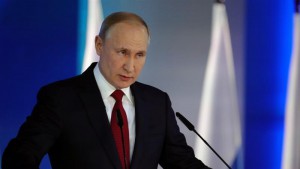The death of Alexi Navalny has been heavily spotlighted in the media.
Rightly so, in some ways. He was seen – by us, at least – as the last real political opposition to Putin: so his death is significant.
But there’s been a bit of whitewashing, predictably. Since Navalny’s incarceration on trumped up charges (let’s face it – he was a political prisoner), Western political and media discourse has largely painted him as a martyr and as a voice for a liberal, progressive and democratic Russia.
They’d rather forget that he had dalliances with far right ultranationalists or that he once referred to Georgians as “rodents”, once called Muslims “cockroaches”, or said things like “sanitisation” of Russia was needed to deal with foreigners.
The PR rehabilitation of Navalny in the West was presumably for the sake of holding up a symbolic rival to Putin: maintaining a lingering figure around whom dissatisfied Russians might one day rally.
Arguments as to whether Navalny was a foreign-backed agent meant to help destabilise Russia (as claimed by Putin) or not are something I won’t enter into here.
He was clearly a Western asset: that doesn’t make him a Western ‘agent’ in the strict sense. It’s entirely possible to be both a genuine, self-propelled opposition figure and someone favoured or supported by the West at the same time, and without it being a conspiracy.
There are Russian-supported political figures in Western countries and there are Western-supported political figures in Russia.
And both sides are continually trying to destabilise each other, as a simply matter of course.
But naturally, his death has been almost immediately attributed to murder on Putin’s orders: predictably, via novichok poisoning.
I’m not going to contest this too much. I have no difficulty believing Kremlin agents would murder Navalny unceremoniously like this.
Putin Inc. has seemingly assassinated more opposition figures and inconvenient actors than even can be kept track of, after all. People fall out of windows. Or are even shot multiple times while walking passed the Kremlin.
If these weren’t murders we’re talking about, it would almost be satirical for how brazen it has often been.
That being said, for balance, I will share a link to an article here that offers reasons to question the premature narrative of murder via poisoning.
And I want to present some of my own questions about the matter here too.
You know, we can’t take anything at face value these days. Given that no examination of Navalny’s body has taken place, it’s unclear how anyone can immediately declare the cause of death to have been novichok poisoning.
What’s also curious to me is that Navalny was the subject of an Oscar-winning film two years ago that massively raised his profile: and that film, as explained here by the BBC, was very much centered on foreshadowing Navalny’s death at the hands of the Putin regime.
Now you could look at this as simple foreshadowing of a highly likely outcome – Putin does tend to eliminate all opponents or perceived threats. Because that’s how an effective mafia operates.
But, if you were to be more cynical, you might wonder if the high-profile Oscar-winning film was a sort of predictive programming, planting the idea of Navalny’s imminent death into popular consciousness.
The film even opens with Navalny being asked about his seemingly inevitable death at the regime’s hands. Navalny even says, “It’s like you’re making a movie for the case of my death…”

Also of note, of course, is that the major event in the film is Navalny being poisoned with novichok. His life was saved by an emergency landing in Berlin, where he was treated.
During the course of these events, Navalny apparently tricks an FSB agent into admitting in a phone-call that they’d tried to kill him with novichok.
This was generally taken as proof of the novichok plot. But some doubt an FSB agent would be so inept as to spill the beans to Navalny in a phone-call.
That being said, the two bumbling idiots who were in Salisbury when the novichok poisoning of Sergei Skripal took place proves that FSB agents aren’t all masters of their trade.
So… who knows?
But, assuming the poisoning that took place in the film was genuinely novichok administered by Kremlin agents, why would the regime now resort to novichok poisoning again as a method for murdering Navalny?
Is novichok the only option these days? Aren’t there other ways to kill a defenseless prisoner?
I had assumed the point of using something like novichok is for covert and fly-by-night type assassinations, where you want to act sneakily and you might not even come into direct contact with the target.
But if you’ve got a helpless prisoner entirely at your mercy in a remote location in the Arctic, why kill him with a nerve agent?
And, again, how is anyone so sure it was novichok when no tests have been done on Navalny’s body?
Is it just because that’s what was in the film?
In those circumstances, the nerve agent was a logical method. But I’m not sure the same is true for the present circumstances.
There’s also the fact that Navalny apparently went missing for some time in December and no one seemed to know where he was or what was happening.
Which all seemed a little strange: though some were already viewing that as a prelude to Navalny winding up dead.
Whatever questions I’ve raised here, it’s certainly not to say that the Kremlin’s official announcement, whatever it ends up being, can be trusted at all: because obviously it can’t.
And ‘sudden death syndrome’ seems like they’re literally trolling Navalny’s family and supporters.
Again, I tend to think Navalny was murdered: but his death is clearly being used as a propaganda exercise and seems even to have been set up that way in advance.
And, in truth, it seems a bit stupid for Putin to have wanted Navalny killed just ahead of so-called ‘elections’ in Russia. Doesn’t that look a lot worse than just letting Navalny live?
It’s not like he was a real political threat, or posed any problem from his Arctic prison. And it’s not like Russian elections are above board anyway – Putin literally can’t lose in March.
So it’s hard to see what urgency there was to do away with someone like Navalny literally just weeks before the election. If anything, it’s inconvenient for the regime: turning Navalny into a symbol and martyr at the least logical time to do so.
It’s not as though Putin comes out of this looking good.

Then again, maybe Putin just doesn’t care how things look anymore.
Or maybe, as some claim, he’s become more and more paranoid: especially after the whole debacle with Yevgeny Prighozin and the Wagner Group last year.
Putting various foreign figures on a so called ‘Wanted List’ seems like overstretch too: and like an international PR misfire.
This apparent hit-list reportedly includes Estonian Prime Minister Kaja Kallas.
Though, again, I guess it would be in keeping with mafia tendencies.
Or maybe Putin is playing games. Maybe he is, as those crazy Q-anoners liked to say about Trump, playing some kind of 4D chess.
From doing the Tucker Carlson interview to possibly killing off Navalny, all in the space of a fortnight, maybe he’s just playing mind games.
Though, again, the timing of Navalny’s death seems off. Not just because the election is just weeks away, but because Putin – at least in his own mind – only just scored a foreign propaganda win with the Tucker Carlson interview.
Why do that, and then just a week or so later authorise a murder that was always going to undermine your image internationally?
I did manage – but only over the course of a week – to finish watching all of Putin’s interview with Tucker Carlson. In the end, it was all obvious, standard stuff. But, in fairness, I’ve seen Putin interviewed before, and the rhetoric is largely unchanging.
What I’m more curious about is who pushed for the interview in the first place. Was it Carlson wanting the big scoop? Or was it the Kremlin’s initiative – with the former Fox News host being a useful vehicle for a Putin PR exercise?
However things are going to play out in the months or years ahead, Putin looks and sounds like the guy who’s going to win – but it doesn’t look like he’s all that into it anymore.
He looks tired. And bored. Maybe after you’ve eliminated all your enemies, killed off the dangers of democracy, and established an iron grip, boredom eventually and inevitably sets in.
Putin doesn’t seem to have any real political opponents left. And it doesn’t look like there are any real dissident movements of note to worry about.
The elections are pretty much foregone conclusions. Protesters are put in jail.
And if Trump wins the US election this year, that’s presumably another step in the right direction for the Kremlin, particularly with Trump’s lack of enthusiasm for NATO.
It’s difficult to see precisely how the war in Ukraine will end, but it’s hard to envision Putin losing. Unless the Ukraine situation triggers a broader conflict.
As much as some commentators like to say that Russia and Putin have suffered and been weakened by this war, Putin – unlike Ukraine’s Western backers – are in it to the bitter end, unable to accept anything less than vindication.
The reported threat this week that Russia intends to nuke London, Berlin and other locations in the event of losing the war in Ukraine may or may not be mere sabre-rattling, but it’s another indicator of Moscow’s absolute unwillingness to fail or be humiliated in Ukraine.
As for Alexei Navalny, it’s possible he was offed on Putin’s orders, even likely. It’s also possible he simply died from accumulated causes due to the presumably bad conditions he was being kept in.
Either way, Western propaganda will depict his death however best suits the foreign policy agenda: and likewise the Kremlin will portray his death however best fits Putin’s broader narratives.
In conclusion… no, I don’t have a conclusion here. Just a sigh.





But Novochok never kills anyone, right? It’s literally the most deadly nerve agent ever known to humankind and yet all the known targets of it have survived. So I’m not quite sure why the FSB keeps on using it when a more straightforward bullet in the head or a dose of regular poison is generally more effective and reliable!
I guess because it’s what *we* are comfortable with now?